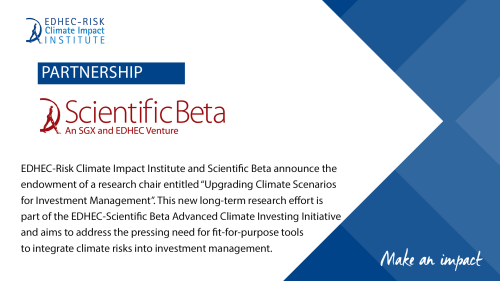
EDHEC and Scientific Beta establish climate-risk modelling research chair
Written on 05 Oct 2023.

EDHEC-Risk Climate Impact Institute and Scientific Beta are pleased to announce the endowment of a research chair entitled “Upgrading Climate Scenarios for Investment Management”. This new long-term research effort is part of the EDHEC-Scientific Beta Advanced Climate Investing Initiative and aims to address the pressing need for fit-for-purpose tools to integrate climate risks into investment management.
While climate change increasingly becomes a tangible reality, with more frequent and severe extreme weather events, the bulk of damages to nature, people, and economies remains in the future. This makes historical data and traditional statistical estimation methods largely irrelevant to assess and manage climate risks and explains why climate scenario analysis and stress testing have taken central stage in the investor toolbox.
In their current state however, they are rather crude what-if tools suited to assisting long-term strategic thinking about uncertainty and spotting fragilities to potential shocks. Considerable work is required to extend and repurpose climate scenarios for risk and investment management purposes. The critical challenge is to embed scenario analysis in a coherent probabilistic framework, enabling finance professionals to compute relevant risk and return metrics.
EDHEC-Risk Climate Impact Institute Scientific Director Professor Riccardo Rebonato will lead the research effort. A nuclear physicist by training, Professor Rebonato has made notable contributions to quantitative portfolio theory and risk modelling and management and has held senior research positions in the financial industry.
“We are delighted to support EDHEC-Risk Climate Impact Institute in this radical effort to bring climate-risk modelling tools to the next level”, commented Scientific Beta Chief Executive Officer Kin Yee Ng. “We are looking forward to building on our partnership with EDHEC Business School to incorporate these advances into our index offerings and to continue to benefit from state-of-the-art academic research as Scientific Beta has always done since it was founded over ten years ago.”
“Embedding scenario analysis in a coherent probabilistic framework is a particularly tall order because of the considerable uncertainty around the physics and economics of climate change; delivering on this goal however would mark a major step forward in climate risk analysis and portfolio management. Professor Rebonato has assembled an exceptional team to tackle this challenge and we are grateful to Scientific Beta for their support. We look forward to presenting the first research results, which should be of particular interest to long-term investors”, said EDHEC-Risk Climate Impact Institute Director Frédéric Ducoulombier.
Frédéric Ducoulombier and Riccardo Rebonato will unveil initial findings from the research chair at the Scientific Beta Days Europe 2023 conference on November 14 & 15, 2023 at the Barbizon Palace in Amsterdam. The presentation will discuss the limitations of current modelling tools and outline strategies to transition from climate risk uncertainty to climate risk and portfolio management.
About Professor Riccardo Rebonato
Riccardo Rebonato is the Scientific Director of EDHEC-Risk Climate Impact Institute and Professor of Finance at EDHEC Business School. He heads EDHEC-Risk Climate Impact Institute’s “Impact of Climate Change on Asset Prices” research programme and the “Upgrading Climate Scenarios for Investment Management” research chair supported by Scientific Beta. Prior to joining EDHEC Business School in 2016, he was Global Head of Interest Rate and FX Research at asset manager PIMCO having previously held senior risk management and quantitative research positions in the banking industry. During his industry career, he served on the boards of ISDA and GARP, and held visiting and adjunct research and teaching positions at Edinburgh University (Political Economics and Sociology), Oxford University (Mathematical Finance and Physics), and Imperial College, London (Financial Economics). Riccardo is currently Series Editor for the Cambridge Elements in Quantitative Finance. He has published an extensive body of academic work, including more than 10 books and some 50 articles in refereed journals, in the areas of derivatives pricing, risk management, asset pricing and, latterly, the economics of climate change. His latest book deals with using economics to tackle climate change. In 2023, the Journal of Portfolio Management named him “PMR Quant Researcher of the Year” citing his pioneering contributions to the application of Bayesian networks to stress testing and asset allocation. He holds doctorates in Nuclear Engineering and Condensed Matter Physics.
About Scientific Beta
Scientific Beta aims to be the first provider of a smart factor and ESG/climate index platform to help investors understand and invest in advanced factor and ESG/climate equity strategies. Established by EDHEC-Risk Institute, one of the top academic institutions in the field of fundamental and applied research for the investment industry, Scientific Beta shares the same concern for scientific rigour and veracity, which it applies to all the services that it offers investors and asset managers.
On January 31, 2020, Singapore Exchange (SGX) acquired a majority stake in Scientific Beta. SGX is maintaining the strong collaboration with EDHEC Business School, and principles of independent, empirical-based academic research, that have benefited Scientific Beta's development to date. Since 2015, Scientific Beta has also been offering highly advanced strategies in the area of ESG and climate change, whether involving options integrated into smart beta indices or pure ESG or climate benchmarks.
As a complement to its own research, Scientific Beta supports an important research initiative developed by EDHEC on ESG and climate investing and cooperates with V.E and ISS ESG for the construction of its ESG and climate indices.

